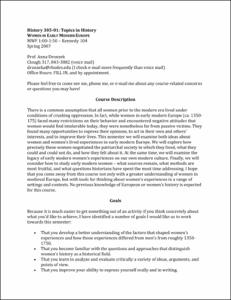Please use this identifier to cite or link to this item:
http://hdl.handle.net/10267/3332Full metadata record
| DC Field | Value | Language |
|---|---|---|
| dc.contributor.author | Dronzek, Anna | - |
| dc.date.accessioned | 2009-02-12T18:06:15Z | - |
| dc.date.available | 2009-02-12T18:06:15Z | - |
| dc.date.issued | 2007-01-10 | - |
| dc.identifier.uri | http://hdl.handle.net/10267/3332 | - |
| dc.description | This syllabus was submitted to the Office of Academic Affairs by the course instructor | en_US |
| dc.description.abstract | There is a common assumption that all women prior to the modern era lived under conditions of crushing oppression. In fact, while women in early modern Europe (ca. 1350‐ 175) faced many restrictions on their behavior and encountered negative attitudes that women would find intolerable today, they were nonetheless far from passive victims. They found many opportunities to express their opinions, to act in their own and others’ interests, and to improve their lives. This semester we will examine both ideas about women and women’s lived experiences in early modern Europe. We will explore how precisely these women negotiated the patriarchal society in which they lived, what they could and could not do, and how they felt about it. At the same time, we will examine the legacy of early modern women’s experiences on our own modern culture. Finally, we will consider how to study early modern women – what sources remain, what methods are most fruitful, and what questions historians have spent the most time addressing. I hope that you come away from this course not only with a greater understanding of women in medieval Europe, but with tools for thinking about women’s experiences in a range of settings and contexts. No previous knowledge of European or women’s history is expected for this course.Because it is much easier to get something out of an activity if you think concretely about what you’d like to achieve, I have identified a number of goals I would like us to work towards this semester: • That you develop a better understanding of the factors that shaped women’s experiences and how those experiences differed from men’s from roughly 1350‐ 1750. • That you become familiar with the questions and approaches that distinguish women’s history as a historical field. • That you learn to analyze and evaluate critically a variety of ideas, arguments, and points of view. • That you improve your ability to express yourself orally and in writing. | en_US |
| dc.language.iso | en_US | en_US |
| dc.publisher | Memphis, Tenn. : Rhodes College | en_US |
| dc.relation.ispartofseries | Syllabi CRN | - |
| dc.relation.ispartofseries | 27132 | - |
| dc.rights | Rhodes College owns the rights to the archival digital objects in this collection. Objects are made available for educational use only and may not be used for any non-educational or commercial purpose. Approved educational uses include private research and scholarship, teaching, and student projects. For additional information please contact archives@rhodes.edu. Fees may apply. | - |
| dc.subject | History, Department of | en_US |
| dc.subject | Syllabus | en_US |
| dc.subject | Text | en_US |
| dc.subject | Curriculum | en_US |
| dc.subject | 2007 Spring | en_US |
| dc.title | HIST 305-01, Topics in History: Women in Early Modern Europe, Spring 2007 | en_US |
| dc.type | Syllabus | en_US |
| Appears in Collections: | Course Syllabi | |
Files in This Item:
| File | Description | Size | Format | |
|---|---|---|---|---|
| 2007_sp_HIST_305-01.pdf | 182.01 kB | Adobe PDF |  View/Open |
Items in DSpace are protected by copyright, with all rights reserved, unless otherwise indicated.